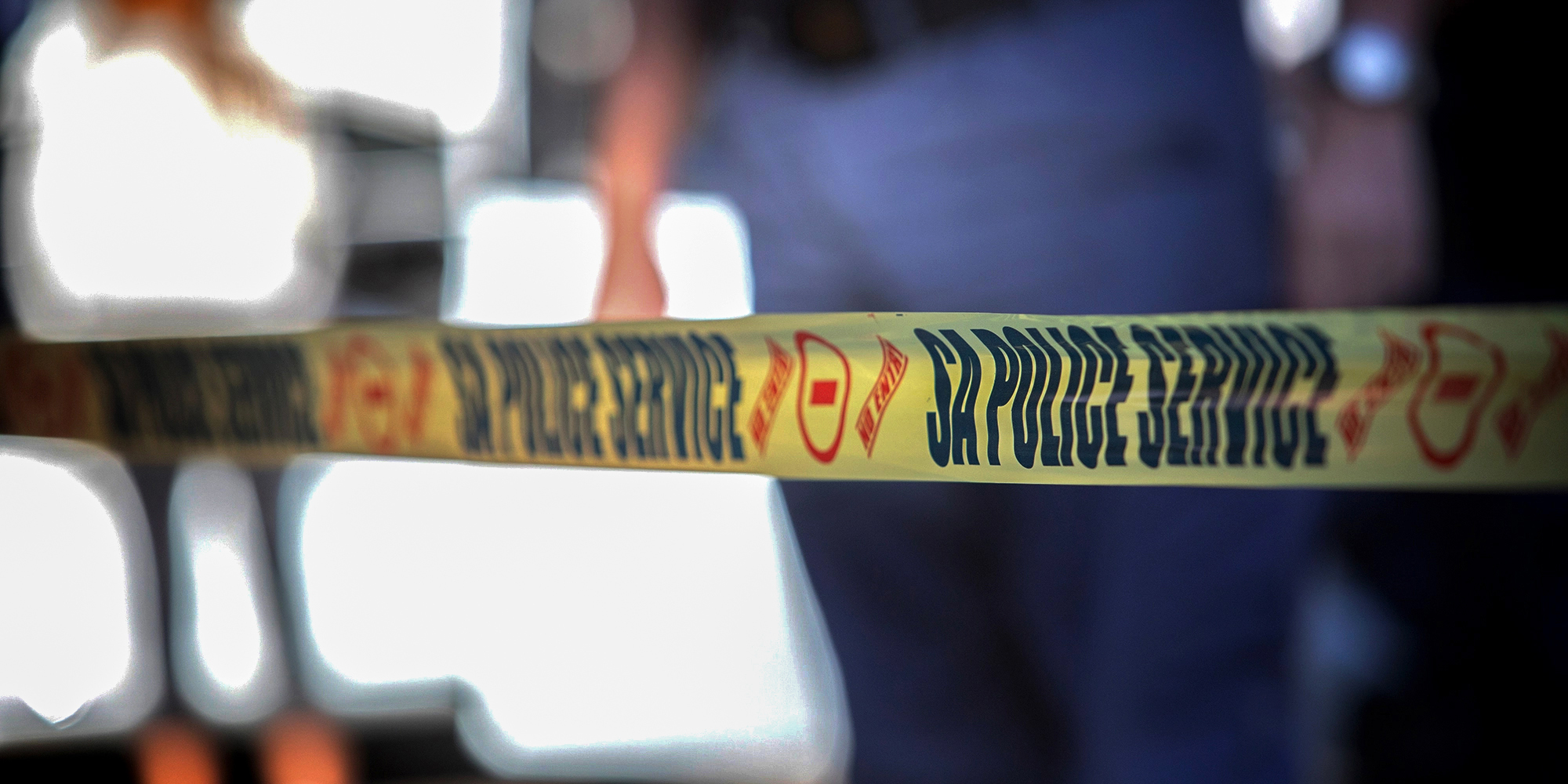On Friday night, 18 July, about 10 suspects entered a tavern in the Shoba informal settlement in Olievenhoutbosch – a township in Centurion – and opened fire without saying a word, according to SAPS. Five people – two females and three males – were shot and killed, while multiple others were injured.
“It is reported that the suspects came to a tavern and started shooting randomly, without saying a word,” said police spokesperson Lieutenant Colonel Mavela Masondo.“The motive for the shooting is unknown at this stage.”
Police have opened a case of murder and attempted murder and are conducting a manhunt for the suspects.
Anna Setladi, a ward committee member and Shoba resident, told Daily Maverick that she heard gunshots around 9:30pm that continued intermittently for half an hour.
“I’m not staying far from that tavern. We heard the shooting, of big guns shooting… for a long time,” she recalled.
“Just before 10:30pm, after the shooting had ended, we went to the tavern and found five bodies inside,” she said.
Setladi said they took the injured to hospital in a taxi, believing it would be faster than waiting for an ambulance. About 10 people were taken to hospital.
A neighbour of Setladi’s, who was at the tavern when the attack began and asked to remain anonymous due to safety concerns, said the gunmen entered asking for the tavern owner, who fled. The suspects allegedly took money and phones from patrons before opening fire. The neighbour managed to escape by hiding and running from the scene.
‘Unprecedented attack’
SAPS Lieutenant Colonel Mavela Masondo told Daily Maverick that the police questioned the tavern owner, who was initially detained for not having proper documentation. However, he was ultimately charged for having an illegal electricity connection at the tavern.
“At first, he couldn’t provide documents because he is a foreign national, but later he was able to produce them,” Masondo said.
Masondo acknowledged challenges in the area, but stressed that police were actively working to address them through several operations.
“Since March this year, we have arrested 420 illegal immigrants in the Shoba informal settlement,” he said, referring to Operation Shanela. “We have also closed more than 17 illegal liquor outlets.”
He said the tavern where the shooting occurred had previously been shut down for operating without a liquor licence, but later reopened after the owner paid an admission of guilt fine.
“Illegal liquor outlets are the main generator of contact crimes – murder, rape, assault – so that’s the reason we target and close them down.”
“There is crime in Shoba, but what happened on Friday was the first time [something like this] occurred,” said Ward 77 councillor Tembeni Thabatha, who confirmed the attack was unprecedented in the area.
Setladi, who has lived in Shoba since 2002, said that while there had been previous incidents of gun violence and crime, the area suffered mostly from petty crime. This incident had left the community shocked and afraid.
She credited the police for arriving at the scene promptly, taking control and questioning tavern staff, but noted that their response was often inconsistent.
She urged authorities to conduct more unannounced checks or raids, believing that these surprise operations would help curb criminal activity.
Councillor Thabatha said he advised against holding a public meeting in response to the incident.
“We don’t know who’s going to attend that meeting – they’re going to put their lives in danger. They must leave the police to do the investigation.”
He said the community and local leaders had called for a coordinated operation involving the police, the community policing forum and Home Affairs to verify residents’ documentation. He said the area included many undocumented foreign nationals.
On Monday, 21 July, the Gauteng Provincial Legislature’s community safety committee released a statement condemning the “horrific shooting incident” and extended condolences to the victims’ families. The committee said that while the motive was still under investigation, preliminary reports suggested possible links to turf wars involving illicit mining operations.
The committee called for intensified efforts to shut down illegal establishments and appealed to the public to assist in apprehending the suspects.
“The fight against crime cannot be won by the police alone. The more the community gets involved, the greater the chances of success.”
Rise in tavern and shebeen crime
There has been an ostensible rise in violent attacks on taverns in South African townships. The Olievenhoutbosch shooting is the latest in a troubling pattern of mass shootings in recent months.
In October 2024, eight people were killed in Orange Farm. In January 2025, another eight died in Mpumalanga, and earlier this year, four were killed in KwaZulu-Natal.
Read more: Six killed, dozens injured as gunmen target Johannesburg taverns over festive season
“When it comes to firearm violence in the context of taverns or shebeens, what we see, there’s quite a lot of literature out there about interpersonal violence,” said Dr Guy Lamb, a criminologist from Stellenbosch University’s Department of Political Science.
Lamb said that police data and public health research showed violence in South Africa was often concentrated in alcohol-serving venues – particularly in townships and informal settlements – because alcohol was a major facilitator of violent confrontations.
“Alcohol tends to accelerate those altercations and tend to result in the recourse to violence quite quickly,” he said.
Research by Andrew Charman and Leif Petersen of the Sustainable Livelihoods Foundation looked at how informal drinking venues (shebeens) often operated in environments with little or no policing and a sense of illegality and lack of regulation, making them particularly vulnerable to violence and criminal activity.
Their Safe Shebeens Project explored practical steps to improve safety in these venues, and worked with several shebeen owners to establish interventions such as better lighting, community-driven rules and closer engagement with local authorities that could reduce the risk of alcohol-related violence.
Pattern of extortion
Beyond interpersonal disputes, Lamb indicated an emerging pattern of extortion, where shebeen owners were targeted if they didn’t pay “protection money”. This often manifested as seemingly random shootings, which served both as punishment for non-payment and a warning to other business owners to comply with extortion demands.
“If shebeen owners are not paying up, then their businesses can be targeted with violence, and it seems to be sort of randomised shooting, demonstrating that if you don’t pay up there’ll be consequences, but also that’s to send messages to other business owners that there will be violent consequences if you don’t pay the protection money,” explained Lamb.
This aligns with eyewitness accounts who said that the gunmen asked for the tavern owner.
Gareth Newman from the Institute for Security Studies explained that taverns were common social spots where people, including members of criminal networks, gathered. He noted that mass shootings at these venues often stemmed from conflicts between rival groups or gangs, who typically had access to illegal firearms.
Newman also noted that perpetrators were emboldened by a low chance of arrest, pointing out that, with the police detection rate for murder in South Africa now at around 11%, almost 90% of police murder dockets went unsolved
“They know this, so it’s worth the risk for them if they want to take somebody out or disrupt a criminal gang that they’re in competition with; go there and shoot the place up, send out a message,” said Newman.
“And right now, these groups don’t feel that there’s much chance of them being held accountable by the police. So it’s those factors that probably come into play.” DM
Authorities have appealed to anyone with information to contact the nearest police station or Crime Stop at 08600 10111.





 A manhunt is under way after a mass shooting in an Olievenhoutbosch tavern. (Photo: Leila Dougan)
A manhunt is under way after a mass shooting in an Olievenhoutbosch tavern. (Photo: Leila Dougan)